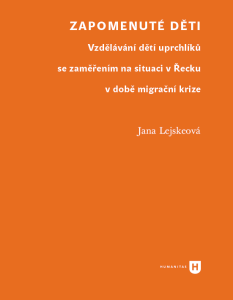
According to UNHCR data from 2020, there are 82 million displaced people in the world, 26 million are refugees. Amongst other lacking needs the access to education is limited and in many cased even non-existent, although education is a child’s right and plays a key role in their future. The focus on refugee education is increasing. In 2018, there were approximately seven and a half million schoolage child refugees, with only 61 % of them having access to primary education (versus 91 % of the total child population), in 2020 it was already 77 % primary school-aged children. Each country approaches the issue differently, in Greece – where the focus of this text lies, child migrants have been around for several years, but they have not had access to education for a long time and some children still do not. The situation was dealt with in various alternative ways, through international organisations, non-profit organizations, volunteers from around the world and refugees themselves. The book describes these issues. It seeks to explore the educational situation of refugee children in the world, focuses on the recent migration crisis in Greece, the legal documents related to the right of the refugee to education at the world, European and Greek level, and introduces educational opportunities for refugee children in Greece, both formal, provided by the state, and informal, provided by volunteers and non-profit organizations.
